North Somerset-based creative agency Harleys Global has partnered with Hive Mind Mead & Brew Co. to produce a three-part YouTube series called How It’s Mead.
Shot across multiple locations in The Wye Valley and Somerset, the series is presented by Kit and Matt Newell, the brothers behind the Welsh brewing company. It provides an inside look at the brewing process, as well as shining a light on the issues facing small food and drink businesses including the massive problem of food counterfeiting. For example, up to a third of the honey in the world is currently believed to be fake, which is a massive issue when it comes to bee conservation and food systems sustainability.
Kit Newell explains: “Many people know mead as an ancient drink made from honey, drunk by Vikings and monks and characters from old story books. But it’s also a fantastically sustainable and environmentally friendly food product, one of the few that actually directly benefits biological diversity in the area it is produced, as long as it’s done properly. Our goal is to use modern brewing techniques to re-establish the drink and pitch mead to today’s drinkers, as well as more broadly encouraging shoppers to make more ethical and sustainable choices with what they’re buying.”
Each episode focuses on a different stage of the mead production process, from bee to bottle and beyond, as well as addressing wider problems and systemic challenges facing any business trying to grow and succeed without losing hold of their values.
Episode guide
Episode one – Hive checks & counterfeit honey
Join Kit & Matt as they check on their over-wintering bees, and chat about the regenerative benefits of mead production and the big problem facing honey producers all over the world.
Episode two – The brewing business
Kit & Matt discuss all things brewing, from process to distribution and why shopping local can benefit small businesses around the world.
Episode three – Community is at the heart of small-business success
In our final episode, Kit & Matt talk about the impact community has on their business and the worry of authenticity in supermarkets.
Russ Bailey, Creative Director at Harleys Global says: “This series was a joy to make. Kit and Matt are fantastic presenters, and were really up for developing ideas together and throwing themselves into the shoot. And producing branded entertainment series like this is a really interesting space to be working in – brands find a new way to get their message out there, and audiences get a lot more from the content.”
Terry Davies, CEO at Harleys Global adds: “The guys at Hive Mind have such great energy and enthusiasm for their fantastic product – they just felt like a natural fit for our branded entertainment team.”
Brand new Agatha Christie adaptation Towards Zero arrived on BBC One and BBC iPlayer on Sunday 2nd March, after filming in and around Bristol with support from the city’s Film Office, and on the Devon coast.

Based on the classic mystery by the best-selling author of all time, the series has been adapted for screen by BAFTA-nominated Rachel Bennette (NW) and directed by the Olivier Award-winning Sam Yates (Magpie). It follows 2023’s hit Christie adaptation Murder is Easy, which was one of the UK’s most watched new dramas of the year across all channels and streamers, averaging 7 million viewers across both parts. It is produced by Mammoth Screen and Agatha Christie Limited for BBC iPlayer and BBC One, in a co-commission with BritBox International.
Bristol Film Office supported filming last Summer at locations including Frog Lane and the nearby Masonic Hall near Park Street, Deanery Lane and Bristol Cathedral, the University of Bristol’s Goldney Hall and Tyntesfield House on the outskirts of the city. The fictional Gull’s Point and Easterhead Bay Hotel locations were shot on the scenic Devon coast.
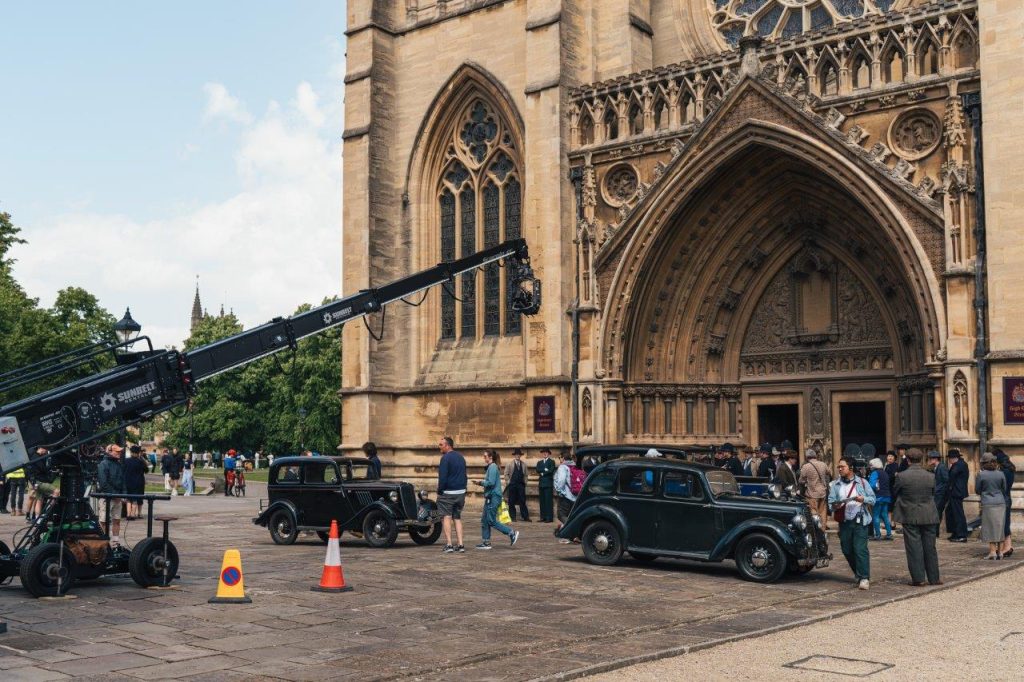
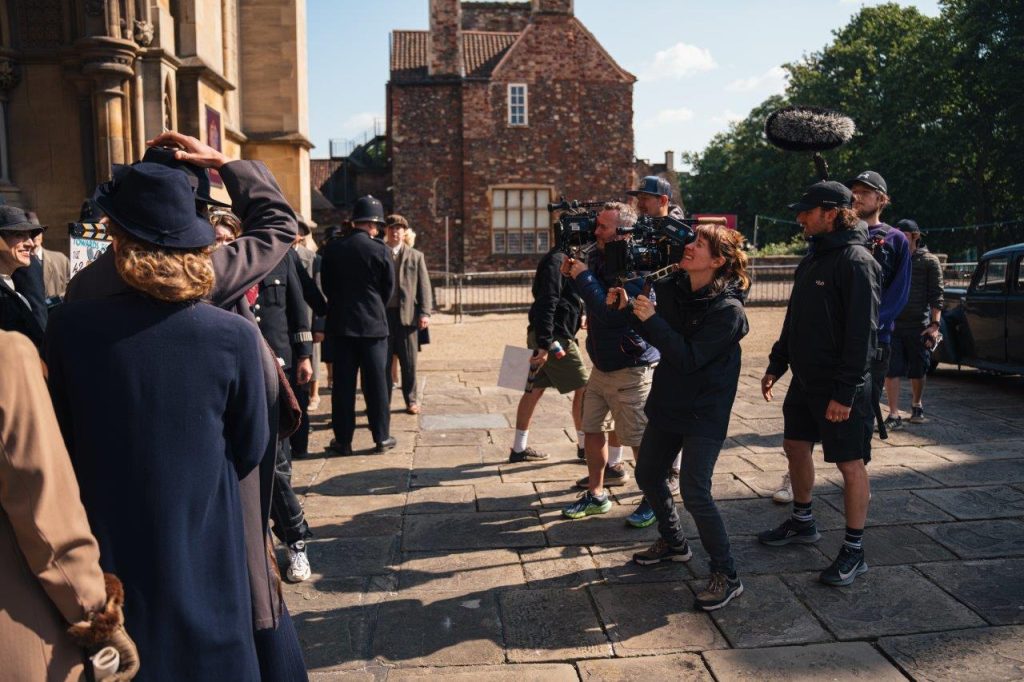
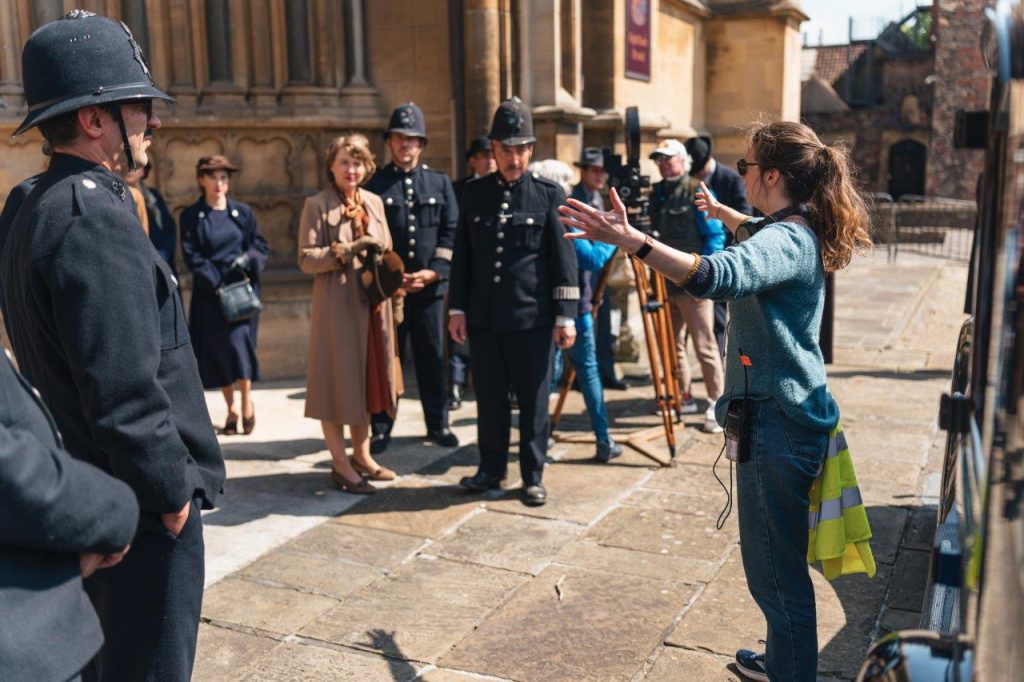
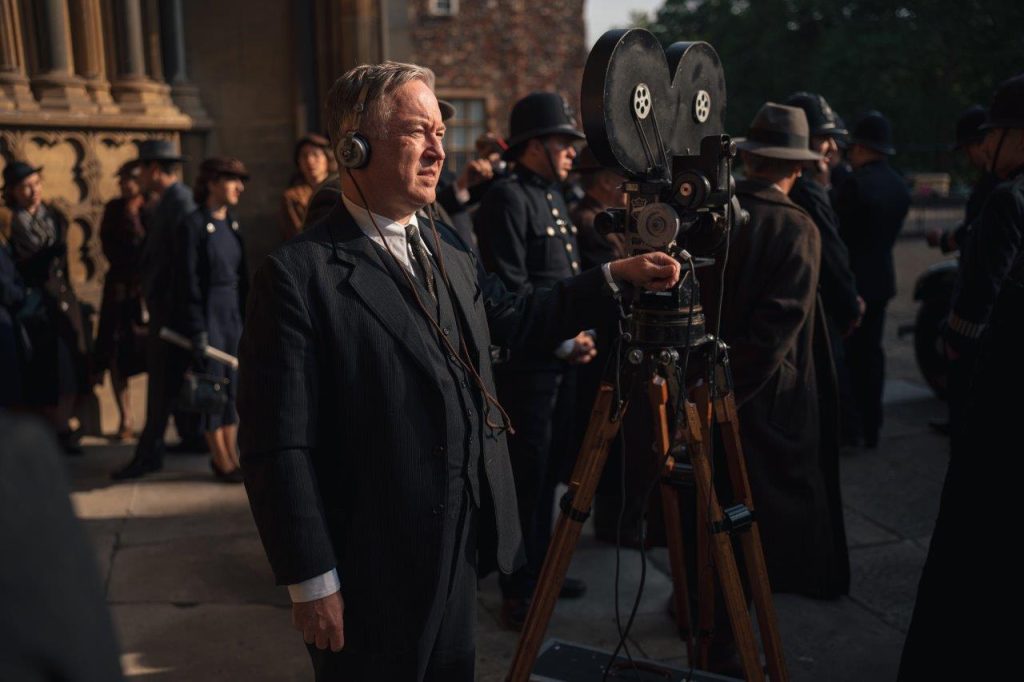
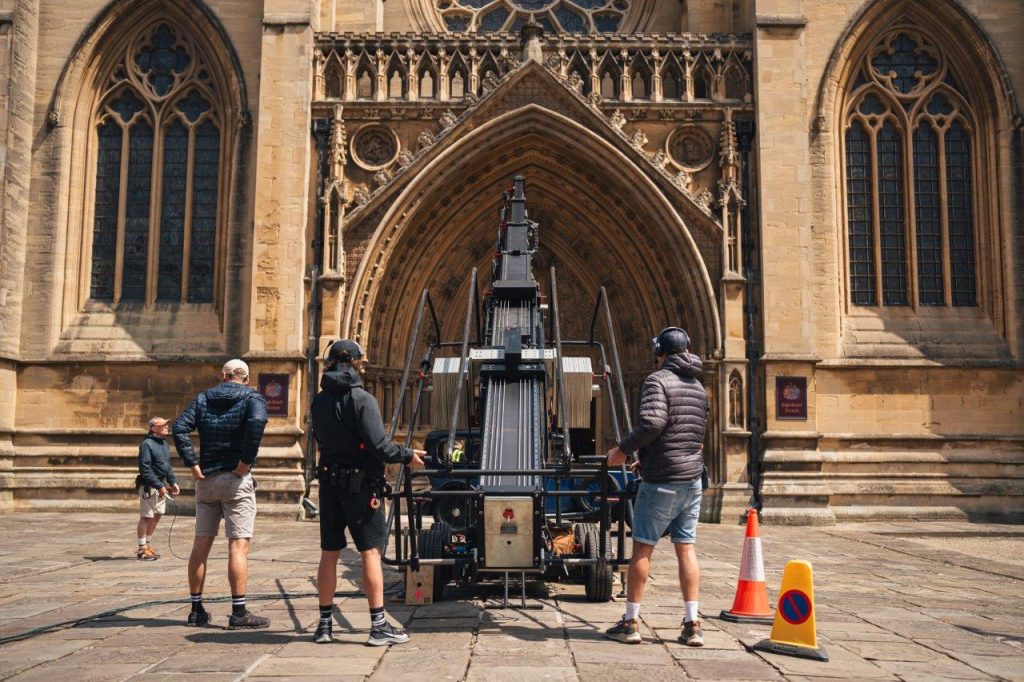 Filming outside Bristol Cathedral and City Hall (images: BBC/Mammoth Screen)
Filming outside Bristol Cathedral and City Hall (images: BBC/Mammoth Screen)Producer Rebecca Durbin, Mammoth Screen, says: “We were excellently served by our Bristol and South West locations when bringing the world of Towards Zero to life. We had some particular challenges – recreating the Royal Courts of Justice, 1930’s Wimbledon Centre Court and a sparkling modern Art Deco hotel geographically opposing an old country pile on a Devon cliffside. The Devonian landscape is so central to Christie’s Towards Zero, so it was really special to be able to film at Burgh Island Hotel and beaches in the Kingsbridge area, just down the coastal path from Christie’s home, Greenways.
“Filming in Central Bristol during a busy working day is always a logistical challenge – traffic management, working with the public, the challenges of period vehicles! – but Bristol Film Office were instrumental in providing welcome practical support and making sure everything ran as smoothly as possible, arranging recces, providing assistance when liaising with locations and councils and offering invaluable local advice and guidance.”
Bristol & South West locations
The nave of Bristol Cathedral acted as a double for the exterior for Westminster’s Royal Courts Of Justice in Towards Zero. Conveniently for the producers, gothic revivalist architect George Edmund Street who masterminded the Law Courts on The Strand in London, also designed the nave of Bristol Cathedral. Sessions House in Usk, South Wales, served as the interior for the Courts, paired with corridors and walkways at Grittleton House in Chippenham (which also served as Sylvia’s boarding school).
Frog Lane in Bristol City Centre served as a busy 1930’s London street. The producers felt that the pale grey architecture of the street had a slightly 1930’s art deco feel that complimented the interiors of Nevile Strange’s fashion-forward apartment, which were shot at Goldney Hall, one of the University of Bristol’s buildings. Despite Goldney Hall being 18th Century, Production Designer Lucienne Suren worked to create a bold, art deco look – the shapes of the murals and art work on the walls echoing the architecture of Frog Lane.
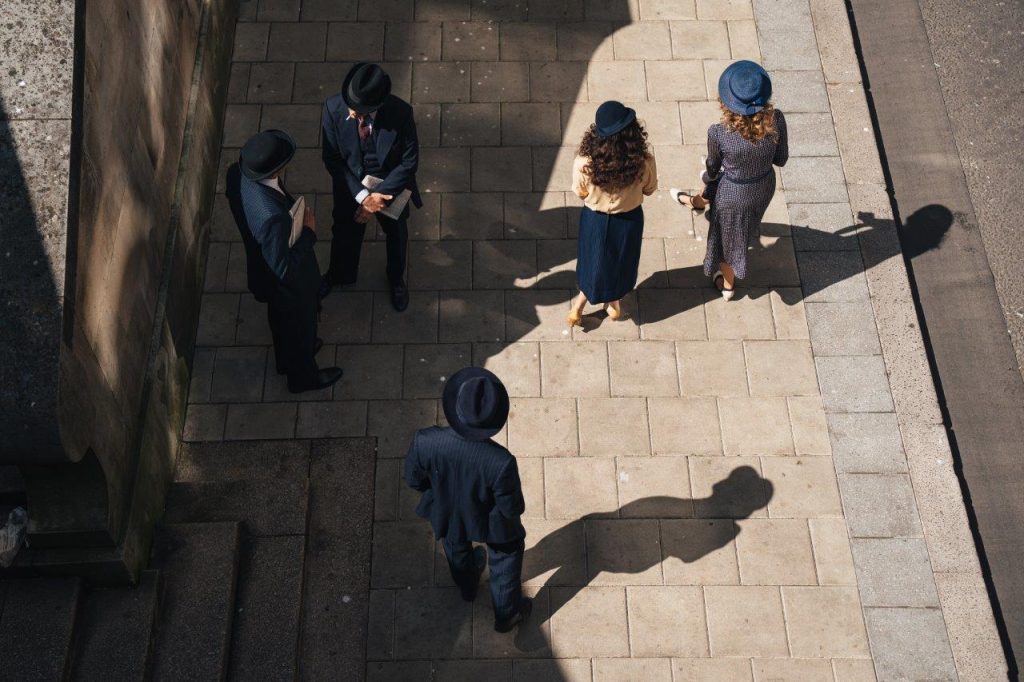
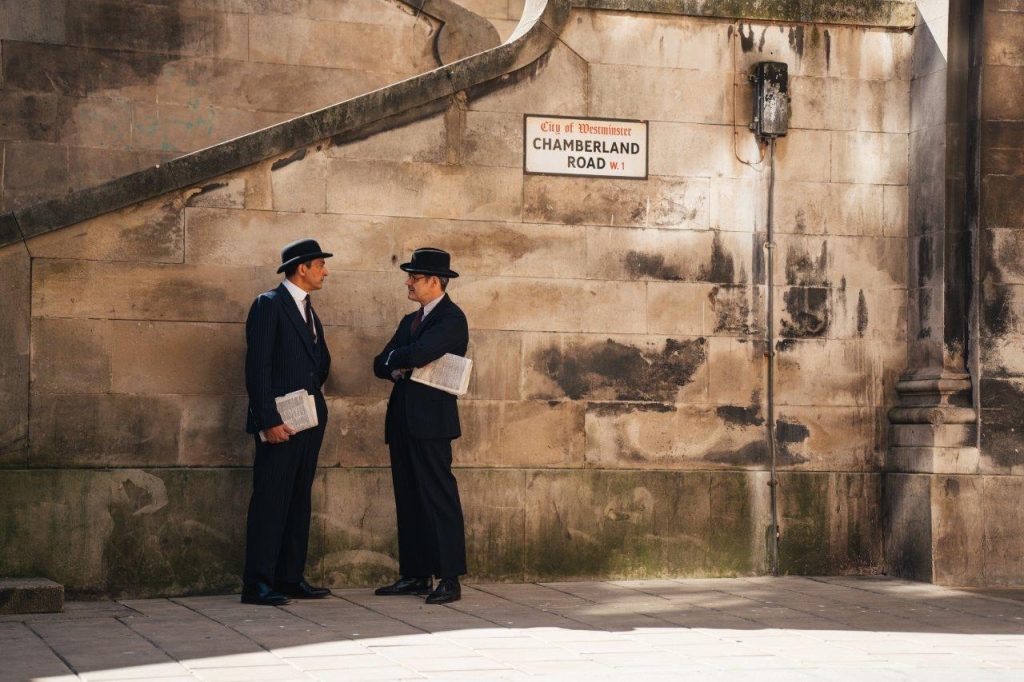

To recreate 1930’s Wimbledon, producers worked with a VFX company to enhance a full-scale replica court built at the Bath & West Showground in Shepton Mallet. A room in The Province of Bristol Masonic Hall on Park Street served as the Wimbledon changing room.
A private home in Wiltshire served as the perfect country house to become Gulls Point, the family seat where matriarch Lady Tressilian rules the roost. The property’s portico overlooked an expansive sweeping green vista that made it easily “transferable” to a cliffside in Devon, with the help of VFX. The private home was paired with the imposing Tyntesfield House, a National Trust property on Bristol’s outskirts. Despite its Gothic exteriors, the “below stairs” kitchen and servants quarters worked very well as a match to the Wiltshire stately home.
The long straight ‘Towards Zero’ vanishing point road was filmed on a tree-lined road on the Badminton Estate.
Devon locations
Easterhead Bay Hotel exteriors were filmed at Burgh Island Hotel near Kingsbridge. The hotel’s sea water swimming pool doubled for the hotel in Nice, South of France, where Nevile and Kay meet. The Forum Bath provided the space for the art department to create the ultra-modern interiors to match with the Art Deco exterior of Burgh Island Hotel.
The beaches at Bantham, where the Avon meets the sea, and the more sheltered cove at Thurlestone, served as the fictional beaches around Saltcreek and Gulls Point. The production team worked closely with local film offices, the council and National Trust to ensure filming activity didn’t impact on local residents, including wildlife and nesting birds.
About Towards Zero
Towards Zero stars Anjelica Huston as Lady Tressilian, Matthew Rhys as Inspector Leach, Clarke Peters as family lawyer Mr Treves, Oliver Jackson-Cohen as British tennis star Nevile Strange who has two ladies in his life: Ella Lily Hyland plays his ex-wife Audrey and Mimi Keene is his new wife Kay. Anjana Vasan is the lady’s companion Mary Aldin, Jack Farthing plays the estranged Thomas Royde, Adam Hugill is Nevile’s mysterious valet Mac, and Grace Doherty is Mr Treves’ ward Sylvia.
England, 1936. After a scandalous celebrity divorce, Nevile Strange and his ex-wife Audrey make the unthinkable decision to spend a summer together at Gull’s Point, their childhood home and the coastal estate of Nevile’s aunt, Lady Tressilian.
With unfinished business between the former childhood sweethearts, plus the presence of Nevile’s new wife Kay, tensions are running high. Add to this a long-suffering lady’s companion, a mysterious gentleman’s valet, an exiled cousin with a grudge, a venerable family lawyer, an inquisitive orphan and a French con man, and soon there will be murder. A troubled detective must rediscover his purpose to untangle a toxic web of jealousy, deceit and dysfunction. Can he solve the crime before another victim meets their death?
An explosive love triangle, a formidable matriarch and a house party of enemies. All compelled… Towards Zero.
Agatha Christie’s Towards Zero (3×60’) is produced by Agatha Christie Limited and Mammoth Screen (part of ITV Studios), and is a co-commission between the BBC and BritBox International. It is adapted by Rachel Bennette, directed by Sam Yates and produced by Rebecca Durbin. Executive producers are James Prichard for Agatha Christie Limited, Sheena Bucktowonsing and Damien Timmer for Mammoth Screen, Danielle Scott-Haughton for the BBC and Jon Farrar, Stephen Nye and Robert Schildhouse for BritBox International.
Agatha Christie’s Towards Zero is available in full on BBC iPlayer from 6am on Sunday 2 March, with episodes airing weekly on BBC One from 9pm that night.
Creating a brand film is an incredible opportunity for businesses to connect with their audience on a deeper level. In today’s fast-paced digital world, a well-crafted brand film can tell your story in a way that resonates emotionally, showcasing not just what you do, but why you do it. This powerful visual medium allows you to highlight your values, mission, and unique offerings while engaging potential customers in an impactful way. Think of it as a compelling narrative that not only builds brand awareness but also fosters trust and loyalty among consumers who are looking for authenticity.
Also, with the rising popularity of video content across social media platforms, having a brand film can significantly increase your reach and visibility. By sharing your story through this dynamic format, you’re not just promoting products or services; you’re creating an experience that invites viewers to be part of your journey. Ultimately, investing in a brand film is about crafting memorable moments that leave lasting impressions – helping you stand out in a crowded marketplace and truly connect with your audience.
The creation of a brand film unfolds in three essential stages: pre-production, production, and post-production. The pre-production phase presents the opportunity to dive deep into understanding a brand’s vision and goals. This is a time to brainstorm ideas, develop scripts, and plan every detail – from casting talent to location scouting- ensuring everything aligns perfectly with the brand message. Moving into the production stage, it becomes all about bringing those ideas to life, capturing stunning visuals and audio that resonate with the brand’s audience. Finally, comes the post-production stage; this involves editing the footage, adding sound design and visual effects that elevate the brand’s story. By following this structured approach to brand film production, you can create captivating content whilst ensuring it effectively conveys your unique narrative to your target audience.
When it comes to managing a project, several key factors come into play that can significantly influence the outcome. First and foremost, establishing a clear project scope is crucial; it sets the foundation for what needs to be achieved and helps keep everyone aligned. Client feedback loops are equally important, as they ensure that things are on the right track and allow for adjustments based on insights. Changes in creative direction can sometimes arise, but with open communication and flexibility, an experienced production company will be able to adapt while still meeting deadlines. Additionally, resource availability plays a vital role in planning – knowing what tools and talent are out there enables an effective execution of the creative vision. Lastly, logistics around filming locations shouldn’t be overlooked; coordinating these details early on helps avoid potential hiccups later in the process. Keeping all these elements in check, enables a smooth workflow that leads to great results for clients while fostering a collaborative environment that inspires creativity.
There are several key steps to bringing a brand film to life. It all starts with scripting and storyboarding, working closely with a brand to craft a compelling and memorable narrative. Once the script is locked down, the next phase is finding the perfect faces and voices that embody your brand’s essence. Seeking out settings that enhance your story and create an authentic backdrop for your brand film shouldn’t be underestimated. Filming days can be scheduled, dedicated to capturing every important moment and making sure everything aligns with the creative vision. After shooting, the editing process usually begins – this is where the footage is carefully pieced together to create a polished final cut that genuinely reflects your brand’s message. Each step of this process is designed to tell a brand’s unique story in a way that connects, captivates and engages viewers.
In terms of brand film creation, the average turnaround time can vary significantly based on the project’s scope and complexity. Typically, a quick turnaround project might take anywhere from a few weeks to a month, allowing brands to get their message out swiftly without sacrificing quality. However, for those looking for something more comprehensive – complete with detailed storytelling and high production values – the process could extend to several months. This is where understanding your goals becomes crucial; knowing whether you need a rapid response or an in-depth exploration can help streamline the approach. We’ve had clients who opted for both styles: one brand needed a lively promotional video in just two weeks for an upcoming event, while another invested several months into crafting an intricate narrative that highlighted their mission and values through animated storytelling. Ultimately, whether you’re seeking speed or depth in your brand film creation, we can help guide you through each stage.
Creating a brand film is an exciting journey which can add genuine value to your business. If you’re ready to elevate your brand’s story through captivating visuals and compelling narratives, an engaging brand film could be the answer. Whether you’re looking to attract your audience on social media, enhance your website, or create memorable content for a live event, a well-crafted brand film can make a great difference. At Vivid, we believe that every brand has a unique story waiting to be told. With our expertise in film, motion design and animation, we’d be happy to help you articulate your story in a way that resonates with your audience. Let’s collaborate and bring your vision to life. Reach out today, and let’s start crafting something extraordinary together!
Discover flexible, fully-equipped office spaces tailored to your needs
Whether you’re a startup, growing company, or established enterprise, we offer modern workspaces designed for productivity, collaboration, and comfort.
Our studio features high-speed internet, ergonomic furnishings, access to screening & meeting rooms, kitchen & lounge, and amenities to help your team thrive. With flexible rental options, we provide the ideal environment to support your success.
Why Choose Us?
Included Features:
Optional Extras:
Book a tour today and experience the perfect workspace for your team.
Contact: [email protected]
Rental Price List
Nine Tree Studios, Bristol’s biggest independent studio, has launched a WhatsApp Community to give back to local filmmakers, photographers, creatives, and production companies.
Primarily it’s a free loyalty programme offering studio discounts and freebies, including:
There’s also groups for advice and jobs, and private channels for production companies and studios to collaborate and share advice.
“We’ve always wanted our space to be able to support Bristol’s creative community” said Russell Jones, Co-Founder of Nine Tree Studios.
“Nowadays email newsletters feel old and clunky and aren’t really suited to what we wanted, like offering free studio hire to those who need it, and promoting and discussing events.”
“By virtue of having members we also hope it’ll be a space for freelancers, screen professionals, studios and production companies to share advice, post jobs, collaborate, and generally chit-chat.”
You can join the community at https://chat.whatsapp.com/D64qZ5CmnxCASYEevxDFEV and visit https://www.ninetreestudios.co.uk/community for more information and terms.
***
Nine Tree Studios is Bristol’s largest independent studio.
Suitable for set builds, commercial productions, photography and HETV, the space features two main studios – a 4,640sq ft soundstage and a 567sq ft infinity cove – plus a podcast suite, green rooms, production offices and a 9,000sq ft backlot.
For more information visit www.ninetreestudios.co.uk or email [email protected].
Bristol’s globally respected Encounters film festival will make a comeback in September next year following a change of management which sees Dave Taylor-Matthews take over as Executive Director.
The festival – widely praised for its knack of discovering new talent – cancelled its 2024 edition and cast doubts about the future after it was hit by a series of challenges triggered by Brexit’s impact on access to European funding and the pandemic.
But now Dave Taylor-Matthews, a veteran producer of festivals and live cinema events in the UK and beyond, is working on a re-launch – fixing 24 to 28 September 2025 as the dates of the landmark 30th Encounters and opening the call for entries.
He says:
“There is no way that Bristol, a UNESCO City of Film, nor the sector was prepared to let go of a festival which has a 30 year track record of showcasing brilliant short film, nurturing emerging film-makers and identifying talent and whose alumni include such stand-out figures as Andrea Arnold, Rungano Nyoni, Ruben Östlund, Martin McDonagh, Lynne Ramsay, and Denis Villeneuve.
“We are determined to lead the fight against ‘enshittification’ and are powering ahead with a 2025 programme which will screen bold and inventive new works, feature headline events of wide appeal, provide a space where new creative projects and partnerships are born and where all film fans feel welcome. 30 years of Encounters deserves an epic celebration!”
Entries are being invited now via www.filmfreeway.com/encountersfilmfestival for live action, animated, documentary or experimental films of under 40 mins in length and (to make up for the 2024 festival’s cancellation), completed on or after 1 January 2023.
There will be cash prizes for the top performing films in competition for the international and national grand prix plus the chance to qualify for entry to the British Independent Film Awards or BAFTAs &/or get nominated for a European Film Award.
Among those welcoming the return of Encounters to Bristol’s events calendar are Aardman co-founder David Sproxton; Mark Cosgrove, Cinema Curator at Watershed, and Natalie Moore, manager of Bristol Film Office and of the Bristol UNESCO City of Film programme.
Natalie Moore says:
“For thirty years, Encounters has played a pivotal role for Bristol; nurturing and springboarding film talent, leading industry conversations, and elevating our international profile. The festival’s return in 2025 is fantastic news for both filmmakers and audiences, and the 30th edition promises to be a celebration of everything Encounters does best – gathering film lovers, filmmakers and industry figureheads to enjoy the best shorts around and create film experiences to remember.”
To stay up to date with Encounters’ news, sign-up for the free e-bulletin via the festival’s website at www.encounters.film or find/follow the festival’s accounts on Bluesky, Facebook, Instagram, Vimeo or YouTube.
Creating a corporate video is a fantastic way to convey your brand’s message, values, and offerings to a broader audience. However, to ensure that your video is effective and professional, a bit of thoughtful planning is essential. Let’s dive into five key considerations when embarking on your corporate video project, each expanded to provide you with a richer understanding.
The first step in any successful corporate video project is to clearly define what you want to achieve. Are you introducing a new product, showcasing your company culture, training employees, or boosting brand awareness? Identifying your main goal will guide all your decisions and keep your video focused and relevant.
For instance, a product launch video will have different requirements than an employee training video. A product video should emphasise key features and benefits, perhaps including customer testimonials and a strong call to action to encourage engagement. On the other hand, a training video should be instructional, easy to follow, and break down complex topics into manageable steps.
Clear objectives are the foundation of your video. They’ll help you craft a message that resonates and makes it easier to measure success. Start by asking what you want your audience to think, feel, or do after watching the video. This will shape everything from your script to your visuals.
Knowing who will be watching your video is crucial for making it engaging and impactful. Consider your audience’s demographics, interests, and challenges. Tailoring your content to their needs will make your video more relevant and effective.
For example, a video aimed at potential clients should highlight what sets you apart and how you can solve their problems. Testimonials and case studies can help build trust. Conversely, an internal training video should prioritise clarity and usefulness, addressing your employees’ specific challenges and using real-life scenarios to make the content relatable.
By understanding your audience, you can choose the right tone, style, and messaging. A younger, tech-savvy audience might prefer an informal, fast-paced video, while senior executives might appreciate a more formal and data-driven approach. The better you know your audience, the more effective your video will be.
At the heart of every successful video is a great story. Develop a narrative that not only resonates with your audience but also aligns with your brand message. Good storytelling captures attention, evokes emotions, and makes your message memorable.
Start with a strong hook to grab your viewer’s attention—perhaps an intriguing statement, a surprising fact, or a compelling visual. Then, ensure your story flows smoothly from one point to the next, using a mix of visuals, text, and voiceover to keep the audience engaged. Don’t forget to end with a powerful call to action. Whether you want viewers to visit your website, contact your sales team, or share the video, make sure this final step is clear and compelling.
Incorporating real-life examples, customer testimonials, or behind-the-scenes footage can add authenticity and relatability to your story. People connect with stories about real people and situations, so showcasing your team, your workplace, or satisfied customers can make your video more engaging and trustworthy.
The production quality of your video can significantly impact its success. High-quality visuals and sound convey professionalism and can greatly enhance your brand’s image. Investing in good equipment or a professional production team can make a big difference.
Good lighting, sound, and high-definition cameras are key to a polished video. If your budget allows, hiring professionals for scripting, filming, and editing can elevate your video’s quality, ensuring it looks professional and engaging.
Pay attention to details like background settings, props, and attire, as these should reflect your brand’s image. Remember, poor production quality like shaky cameras, or bad audio can distract from your message and make your video seem unprofessional. Quality production is an investment that pays off in the form of a positive impression on your audience.
Even the best video needs a strategic distribution plan to reach its intended audience. Think about where and how you’ll share your video. Consider using your company’s website, social media platforms, email newsletters, or even industry events.
Each platform may require different formats or lengths, so tailor your video accordingly. For instance, a full-length video might work well on your website or YouTube, while shorter clips could be better suited for social media. Optimise your video for search engines by using relevant keywords in the title, description, and tags to improve visibility and reach a broader audience.
Timing is also crucial. Showcasing your video during a product launch, event, or when your audience is most active can significantly impact its success.
Creating a corporate video that effectively communicates your brand’s message requires careful planning and attention to detail. By defining your objective, understanding your audience, crafting a compelling story, focusing on quality production, and planning for distribution, you can produce a video that not only resonates with your audience but also supports your business goals.
Remember, a well-executed corporate video is more than just a collection of visuals and sounds – it’s a strategic tool that tells your brand’s story, connects with your audience, and drives action. Whether your aim is to attract new clients, train employees, or enhance your brand’s presence, focusing on these five key areas will help you create a video that stands out in a competitive market.
If you’re interested in creating a corporate video, reach out to us today – we’d love to help you see what’s possible.
Hit shows Rivals, The Outlaws and A Good Girl’s Guide to Murder and upcoming releases The Crow Girl, The Road Trip and The Forsyte Saga were among the titles fuelling Bristol’s production boon last year
Film and TV productions shot on location in Bristol or at The Bottle Yard Studios generated an estimated £30 million towards Bristol’s economy in the 2023-24 financial year, according to the latest annual figures from the city’s Film Office.
A total of 32 major productions were assisted by Bristol Film Office and/or The Bottle Yard Studios throughout the reporting period, of which nine were feature films and 23 were high-end TV productions. Altogether 730 filming days were supported in the studio and on location. The economic impact of this production activity was worth £30,038,739 to the Bristol economy. 582 licenses were issued by Bristol Film Office, permitting filming to take place on council-owned streets, properties and green spaces.
Councillor Tony Dyer, Leader of Bristol City Council, says: “These latest figures demonstrate the vital role that Bristol Film Office, The Bottle Yard Studios and our flourishing film and TV sector continues to play in supporting our city’s local economy. We know that since the pandemic some areas of the film industry have struggled, however it’s fantastic to see that the latest television and film hits are attracted to and supported in Bristol. A huge congratulations to all those who contribute to making our local sector such a huge global hit. These figures truly demonstrate the value of their continued dedication and hard work.”
Head of Film Laura Aviles (Bristol City Council) says: “We are pleased to announce these impressive figures, our first to be calculated using Creative England’s improved methodology. Having access to the most up-to-date estimation of the annual economic impact of the productions we support is central to our ability to leverage investment and stimulate further growth for Bristol’s film industry. These new figures show that not only is the city’s film sector continuing to perform well, it is also worth more to Bristol’s economy than previously thought.
“The fact that filming supported by the Studio and Film Office generated an estimated £30 million for Bristol’s economy in 2023-24, a strike year, is an incredible achievement. We know it has been tough for many freelancers working in different parts of the film and TV industry, particularly unscripted. But these figures underline how Bristol has continued to push forward its reputation as a trusted home for high calibre scripted productions, such as Rivals, The Outlaws and A Good Girl’s Guide to Murder. By supporting filming, we are creating direct benefits for the local economy and with our studio hub, supportive Film Office and skilled crew and companies, we hope to continue that momentum in the year ahead.”
Hayley Armstrong, Head of Production Services at Creative England says: “We’re thrilled to see Bristol making the most of the Local Economic Impact Toolkit – a first of its kind resource supporting the accurate measuring and reporting of local economic impacts to demonstrate the true value of the Film and TV sector in local communities across England. The work that Bristol Film Office and The Bottle Yard Studios do is essential in ensuring Bristol continues to attract high-profile productions again and again, and we are proud that the updated Average Local Production Spend Rate Card has evidenced just how successful they have been this past year. We encourage all local authorities to embrace the Toolkit, enabling them to effectively measure and communicate the sector’s benefits, and unlock the full potential of what Film and TV can bring to their communities.”
Titles that were active in pre-production or filming during the reporting period at The Bottle Yard Studios and on location with Film Office assistance included: upcoming romantic comedy The Road Trip (streaming from 26th December on Paramount+); upcoming feature film Bad Apples starring Saoirse Ronan; upcoming period drama adaptation The Forsyte Saga (Masterpiece PBS); upcoming Agatha Christie adaptation The Seven Dials Mystery (Netflix); Jilly Cooper’s Rivals (Disney+); series three of teen spy thriller Alex Rider (Amazon FreeVee); series four of detective drama McDonald & Dodds (ITVX); series three of Stephen Merchant’s comedy-thriller The Outlaws (BBC One/Amazon Prime Video); twisty thriller TrueLove (Channel 4); teen comedy-drama Boarders (BBC Three); and hit young adult mystery thriller A Good Girl’s Guide to Murder (BBC Three).
Daisy May Cooper and Selin Hizli’s BBC One comedy thriller Am I Being Unreasonable and series 5 of CBBC Enid Blyton drama Malory Towers were also filmed at the Studios (and locations outside of Bristol). Wolf Hall: The Mirror and the Light (BBC One/Masterpiece PBS) based production at the Studios whilst filming on location in England and Wales.
Additional titles filmed during the reporting period at Bristol locations with Film Office assistance included: upcoming contemporary psychological thriller The Crow Girl (Paramount+); upcoming feature film The Salt Path starring Gillian Anderson and Jason Isaacs and directed by Marianne Elliot; upcoming feature film Surviving Earth directed by Thea Gajić; Pollywood blockbuster Jatt & Juliet 3; series three of finance drama Industry (BBC One/HBO Max); and action thriller Paris Has Fallen (Amazon Prime Video).
—
About the figures
Why the rise?
The 2023-24 economic impact figure of £30m is almost 50% higher than the £20.1m recorded in 2022-23. The reason behind this increase is that this is the first time Bristol’s figures have been calculated using the new Average Local Production Spend Rate Card recently launched by Creative England’s Filming in England team.
Previously, local authorities calculated the economic impact of their film production sectors using national average ‘spend-per-day’ figures compiled by Creative England with contribution from all national Film Offices’ data. However in 2023, Creative England launched a new Local Economic Impact Toolkit devised by global film industry consultants Olsberg•SPI, “to help local authorities in England more accurately calculate and report on the average local economic impact of location filming activity in their region.”
The Toolkit’s Average Local Production Spend Rate Card offers an improved level of precision as to how productions of certain sizes spend their budget in a location. Previous average spend figures focused primarily on location budgets. This new approach analyses total production expenditure based on where it was spent and the classification of a local authority’s location. This can be whether the production is London-adjacent, shooting in a ‘production hub’ or a ‘developing production location’. Combined with the updated methodology, this accounts for the significant increase in spend per-day figures compared to those which were used prior to 2023.
How are the figures calculated?
A significant number of resources are required to create a film or TV production. Every film crew that works in Bristol needs accommodation, food, transportation, security and other services. A single feature or high-end TV series can spend hundreds of thousands of pounds locally, boosting the revenue of local businesses including hotels, guesthouses, cafes and restaurants, taxi and car rental services and retail stores. Securing part, or all of a shoot in Bristol results in varied levels of expenditure flowing into the local economy, with the range of spend depending on the type of project, what services and resources the project needs to access, and the budget range.
The Average Local Production Spend Rate Card takes all these different types of spend into consideration, including Screen-Production Specific (e.g. crew’s wages and specialist suppliers of local film and TV equipment and services) as well as other categories of Business Support, Construction, Digital Services, Fashion & Beauty, Hospitality & Catering and Local Labour. It provides a frame of reference to gauge the average amount of daily expenditure that can be expected from a specific type of production, depending on the designated classification of the location and the budget range into which the project falls. This is then applied to the data of all productions supported by the Film Office and Studios teams, to calculate an overall estimated economic impact.
Boosting screen tourism
As well as creating short term opportunities for local crew and specialist companies, plus knock on spending in wider business sectors, film and TV shows made in a city have been proven to have a positive longer-term impact on tourism and the visitor economy. Iconic locations featured in popular productions become film tourism attractions, drawing visitors from around the world. Rising numbers of Bristol venues, charities and businesses are working with Bristol Film Office to be introduced to productions as potential filming locations. Being hired for filming helps venues, businesses and community spaces create valuable new revenue streams, whilst in the longer term it leads to an increase in footfall after a TV show or film’s release. Recent examples include Aerospace Bristol which featured in Rivals (Disney+), St Werburgh’s Farm which featured in series three of The Outlaws (BBC One/Amazon Prime Video) and The Georgian House, featured in Sanditon (ITVX).
Distortion Creative Group, the parent company of Studio Giggle, has announced the appointment of Rob King as its new CEO and investor. King’s arrival comes as the company embarks on a rebrand and ambitious expansion strategy, targeting growth in Bristol and the South West, with a vision to become a global creative leader.
With a background in senior roles at renowned organisations such as Abbey Road Studios, Zinc Media owned The Edge Picture Company and a number of award-winning creative agencies. King brings a wealth of experience in sales, marketing, and creative strategy. His focus will be on scaling Studio Giggle’s operations in live events, film, animation, and content production, while transforming Distortion Studios into a world-class virtual production hub.
King sees his new role as an opportunity to take Distortion Creative Group to the next stage of its growth and development. “Studio Giggle is entering its 18th year, and this ‘coming of age’ marks the start of an exciting new chapter for the company. We’ve been a maverick creative force in Bristol, but now we’re set on becoming the go-to agency for creative content in the South West as well as for our clients nationwide and beyond,” he said.
Despite a well-documented downturn in the film world, Distortion Creative Group has seen growth over the past year, expanding its staff by 20% following new work for clients and producing events in locations as far-flung as Singapore and the Middle East. “The vision that directors Jonathan Brigden and Steve Garratt have shown crafting the region’s go-to creative agency is phenomenal. I look forward to collaborating with them on the next steps, as well as working with the talented staff base that has made Distortion Creative Group what it is today.”
While Studio Giggle has traditionally worked with clients in London and internationally, its plans include a focus on Bristol’s burgeoning tech and fintech industries, offering creative and technical production solutions that align with the region’s growing reputation as a global hub for creativity.
“Bristol has been our home for 18 years and it’s a great opportunity to now give back and help businesses in the area excel creatively,” King emphasised.
As part of the expansion plan, King will also oversee the development of Bristol’s first permanent virtual production facility, positioning Distortion Studios as a pioneer in sustainable and cutting-edge production technologies. “We have an incredible mix of creativity, technology, and storytelling that puts us in an advantageous position as the world enters a new era of production possibilities. In particular, our early adoption of AI and software, including Unreal Engine, has revolutionised the creative potential for clients of all sizes,” he added
Looking ahead, Distortion Creative Group is preparing to expand its portfolio. “Our rebrand positions us as pioneers in exciting new areas of creative technologies, so expansion is certainly front of mind,” King noted. “We’re keen, however, to stay true to our values of true collaboration with our clients, technical innovation and award-winning creativity.
Distortion Creative Group is preparing to unveil the details of its growth plans, including the addition of new companies to the Distortion Creative Group. “This isn’t just about a rebrand or staying the same size,” King noted. “We’re on a growth trajectory, and in the next few years , we’ll look back at this moment as the time when we transitioned from a boutique agency to a larger creative group.
Steve Garratt, Distortion Creative Group’s Founder and Creative Director, added: “Rob’s addition marks a pivotal point in our on-going plan to grow a world class creative agency and Virtual Production studio in Bristol. Both Jonathan Brigden and I are excited to welcome Rob to the team and draw on his unique expertise.”
Rob King’s move to Bristol further underscores the company’s commitment to investing in the city’s creative future. His appointment marks a pivotal moment as the company positions itself for sustained growth and global reach.
For further information or to arrange an interview with Rob King, please contact:
Tom Hall: [email protected] (07545980782)
Amy Hunter: [email protected] (0117 972 0081)
About Distortion Creative Group:
Distortion Creative Group is a leading creative agency based in Bristol, UK, offering a full range of services across live events, film, animation, and content production. Its flagship company, Studio Giggle, is known for its innovative approach to storytelling and creative production, with clients including Sky and British Airways. Distortion Studios is at the forefront of virtual production technology, delivering sustainable solutions for clients worldwide.
Do you live in Bristol, BANES or South Glos and fancy working in film/TV, but just don’t know where to start? Applications are now open for Round 3 of the 2024 West of England Film/High-End TV Workforce Development Programme delivered at The Bottle Yard Studios, which supports local people looking to break into behind-the-camera roles on scripted productions made in the region.
Backed by West of England Combined Authority investment, the industry-led programme is delivered by the Studios in partnership with Bristol UNESCO City of Film and Bristol Film Office. The deadline for Round 3 applications is 5pm on Monday 14th October 2024.
The Programme offers tailored training to demystify the world of scripted production and prepare trainees for entry level positions in the industry, with the aim of strengthening the pipeline of diverse local crew talent.
Sessions include an Industry Induction Day at The Bottle Yard Studios and a bespoke 5-week training scheme delivered by Bristol training provider Stepping Up, focused on confidence-building, set etiquette and work-readiness, communication skills and teamwork, wellbeing and resilience, as well as digital and financial literacy and how to find work as a freelancer.
After completing the training, participants are added to a New Entrants Portfolio shared with film and high-end TV productions filming in the region. An Access Fund is provided to support any participants who face a financial barrier to taking part.
One recent participant, who took part in Round 1 of the Programme and went on to work as a trainee on a major High-End TV production filmed at The Bottle Yard Studios this Summer, said:
“Working in film and TV felt unattainable to me before the course and there were so many barriers stopping me from being able to work in the industry, not even knowing where to start for one. The Access Fund meant I could afford to do the course and helped provide what I needed to be able to take on the role fully when I was offered the job.”
Applications are invited from residents of Bristol, Bath and North East Somerset, and South Gloucestershire aged 17 and above* from backgrounds that are currently underrepresented in the industry. Underrepresented groups include: young people aged 17-25*, those not in education, employment or training, under-employed people and those on zero-hour contracts, women, people from the global majority, disabled people, people living with mental health issues, carers and care leavers.
The West of England Combined Authority is working in partnership with Bristol City Council’s Film Services (comprising The Bottle Yard Studios, Bristol UNESCO City of Film and Bristol Film Office) to deliver the Mayoral Priority Skills Fund. This fund provides flexible grant to meet current priority skills gaps in the region. This project is part-funded by the UK Government through the UK Shared Prosperity Fund.
For more information and to apply, visit: https://www.thebottleyard.com/home/skills/west-of-england-film-high-end-tv-workforce-development-programme-2024/
You need to load content from reCAPTCHA to submit the form. Please note that doing so will share data with third-party providers.
More Information